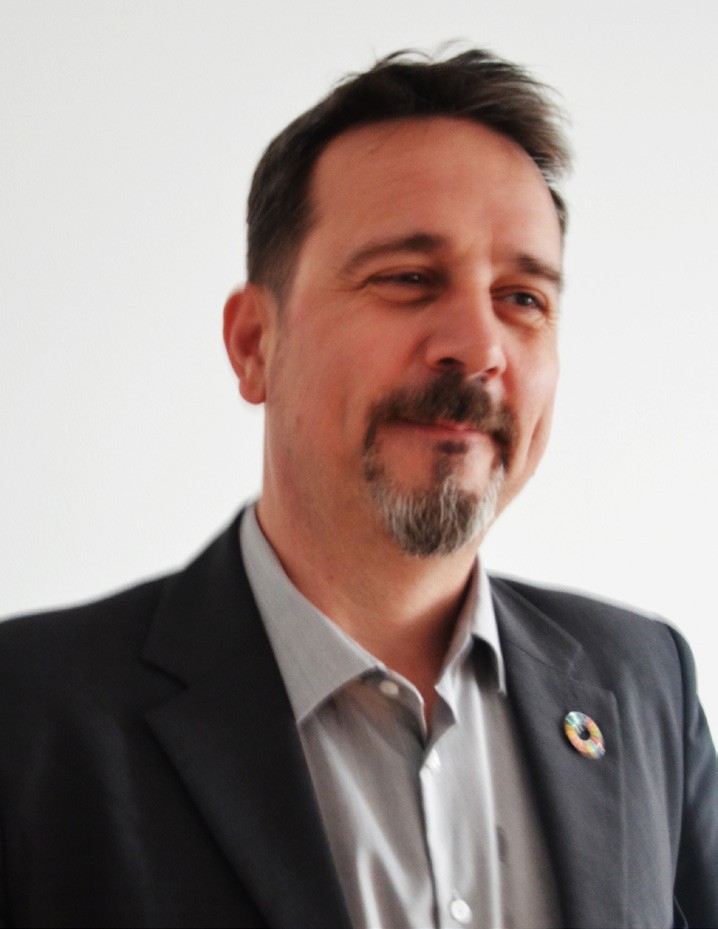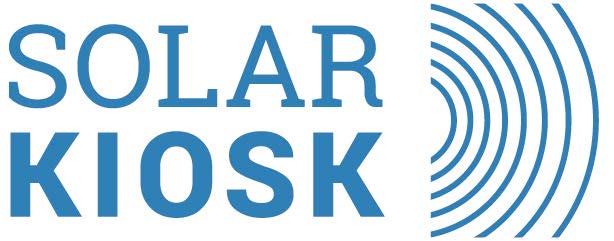Question#1 What was your company’s distinctive strategy for incorporating technology to meet UN Sustainable Development Goal?
Our aim has always been making the most impactful support in underserved, poverty-stricken BOP (Bottom of the Pyramid) communities worldwide by fully focusing on addressing the needs of these communities, ensuring that all our solutions are designed for and target bottom-of-the-pyramid customers in frontier markets. We are transforming these last-mile communities into attractive and serviceable markets we can achieve the greatest possible impact and support the achievement of a great number of UN SDGs.
To achieve this, we employ innovation, strategic partnerships, and intertwining technology with sustainable business cases. Among others, this involves the deployment of our award-winning innovation, the E-HUBB, a solar powered integrated infrastructure solution. These E-HUBBs not only provide clean energy but also function as business, industrial and social centers, promoting local economic development and contributing to a great number of SDGs. By infusing technology into our model, we empower communities and drive positive change in alignment with the UN’s Sustainable Development Goals.
Question#2 What challenges did you face while working on your project/ initiative, and how did you overcome them?
While working on our projects in last mile communities across the globe, we often faced the challenge of a lack of infrastructure in last mile communities, which posed operational difficulties. To address this, we introduced ‘THE PULSE,’ a unique initiative aimed at building sustainable, energy autonomous infrastructure in these communities. By providing solar-powered rural market centers as a platform for providers of various products and commercial, social & public services (THE PULSE Centers), we kickstarted micro-economies and brought life to these underserved areas.
Another challenge we encountered was the singular focus on individual SDG goals by various stakeholders, including investors. In last-mile communities, there is a severe lack across multiple sectors. To tackle this challenge, we developed ‘THE PULSE’ as an open partnership digital and physical platform. It allows us to collaborate with diverse stakeholders and address challenges across multiple sectors simultaneously, thereby maximizing our impact on the ground.
Last but not least, there is a massive shortage of growth capital in the sector. To overcome this challenge, we actively cooperate with the EU Tech Chamber and other partners to raise awareness and advocate for change, in particular amongst the whole range of finance and capital, from angel and early stage to late stage and private equity investors.
By emphasizing the importance of investment in achieving SDG targets whilst creating sustainable and long-lasting commercially feasible businesses – and therefore return on capital -, we sought to create a better understanding among investors of their crucial role in driving sustainable development.
Question#3 How did you involve local communities and stakeholders in your work, and what was their response?
At Solarkiosk, we have a modular partnership platform that enables us to cooperate closely with local communities to understand and study their specific needs. Rather than employing a one-size-fits-all approach, we actively engage with community members to implement the right set of products and services.
This inclusive approach has garnered a highly positive response from local communities and stakeholders. By involving them in the decision-making process, we have created a sense of ownership and empowerment. Cocreating solutions and implementing projects together have resulted in a win-win situation, benefiting the communities, our partners, and Solarkiosk.
Furthermore, our open partnership platform allows us to continuously seek collaborations with organizations, stakeholders, and sectors. By pooling resources, expertise, and networks, we generate collective impact and maximize the effectiveness of our initiatives. This collaborative and community-driven approach ensures that our work remains contextually relevant and aligned with the needs and aspirations of the local communities and stakeholders we serve.
Question#4 Which organizational skills and assets can be harnessed to provide its goods/services without negative environmental and social impacts?
Solarkiosk leverages its unique organizational skills and assets to provide goods and services without negative environmental or, like mentioned before, social impacts. Our approach is rooted in an inclusive process, engaging local communities and stakeholders from the beginning to ensure their needs and perspectives are considered.
Central to our mission is the introduction of access to energy using renewable sources. By deploying solar-powered E-HUBBs as energy hubs and retail outlets, we provide clean and reliable electricity as well as energy products and services to off-grid communities, reducing reliance on fossil fuels and mitigating carbon emissions.
This transition to renewable energy not only has positive environmental impacts but also improves the quality of life for individuals and enhances socio-economic opportunities. And it creates a multitude of profitable businesses, both on the grassroot level and for Solarkiosk and its respective partners.
In addition to renewable energy, Solarkiosk integrates other technologies, such as biogas and clean cooking solutions, to further minimize environmental impacts. By promoting biogas as an alternative energy source and implementing clean cooking technologies, we contribute to reducing deforestation, indoor air pollution, and health hazards associated with traditional cooking methods.
By harnessing these organizational skills and assets, Solarkiosk ensures that its goods and services are provided in a sustainable manner, promoting environmental preservation, social well-being, and community empowerment.
Question#5 What is the role of businesses, governments, and civil society in achieving the SDGs, and how can they work together?
The achievement of the Sustainable Development Goals (SDGs) necessitates integration and collaboration among businesses, governments, and civil society. Solarkiosk recognizes the significance of collective action and actively promotes the integration of these sectors to drive sustainable development.
Through our initiative, ‘THE PULSE,’ we address the crucial need for the right infrastructure in underserved bottom-of-the-pyramid (BOP) communities. By actively involving local communities, governments, NGOs, and businesses, we ensure that the development of last-mile communities is a collaborative effort. By working together, we can tackle the complex challenges faced by these communities and create sustainable solutions with long-lasting impacts.
To enhance our collective impact, stronger partnerships must be fostered among businesses, governments, and civil society. Solarkiosk encourages active engagement in public-private partnerships, in line with SDG 17. These partnerships leverage the unique strengths and resources of each sector, facilitating shared knowledge, resource mobilization, and collaborative action to achieve the SDGs.
By emphasizing integration and collaboration over siloed operations, businesses, governments, and civil society can collectively drive sustainable development, improve livelihoods, and shape a better future for all.
Question#6 What impact has your project had, and what are your future goals?
Since 2011, Solarkiosk has positively transformed the lives of millions at the base of the pyramid. We have provided clean and reliable energy to 7.5 million beneficiaries through solar-powered kiosks, improving their quality of life and creating over 1,000 jobs for women and youth. Our impact is achieved through strong partnerships with global companies, NGOs, government organizations, and the community. We are now seeking financing for our innovative open partnership platform, ‘THE PULSE,’ and plan to establish 69 centres in Rwanda to support sustainable development and serve rural communities. We invite investors to join us in driving positive change. Additionally, we are committed to reducing the environmental impact of local industries and promoting a greener future. Solarkiosk remains dedicated to creating sustainable and inclusive solutions that contribute to the UN SDGs.
Question#7 What advice do you have for individuals/organizations seeking to create positive change and contribute to the SDGs?
For anybody who wants to create positive change and contribute to the SDGs, we would advise maintaining a razor-sharp focus on their mission. Clearly define your goals and align your efforts with the specific SDGs you aim to address. This clarity will guide your actions and ensure that your initiatives have a meaningful impact. Be prepared for challenges and persevere. Creating positive change is not easy, and you will likely face obstacles along the way. Stay committed, adapt to setbacks, and keep pushing forward. Remember that change Foster collaboration and embrace a non-competitive mindset. The challenges we face in achieving the SDGs are vast and complex, requiring collective efforts. Seek out partnerships, engage with diverse stakeholders, and work together towards shared goals. By collaborating, pooling resources, and sharing knowledge, we can magnify our impact and create sustainable change on a larger scale.
Question#8 How would receiving this SDG Award help you improve your impact and scale your project?
Receiving the SDG Award would be a tremendous honour for Solarkiosk and would significantly contribute to improving our impact and scaling our project. Recognition from a prestigious organization like the EU Tech Chamber would not only validate our efforts but also provide us with invaluable benefits.
Firstly, the award would bring us increased visibility within the sustainability and development communities.
This enhanced visibility would amplify our message, attract more stakeholders, and open doors for potential partnerships and collaborations.
Secondly, the award would provide us with exposure on a larger scale. It would help us reach wider audiences, including potential investors, donors, and supporters, who share our commitment to achieving the SDGs. This exposure would enable us to secure additional resources, expand our reach, and accelerate the implementation of our projects.
Overall, the SDG Award would serve as a catalyst for our growth and impact, enabling us to make a greater difference in the lives of underserved communities by providing access to clean energy, fostering economic empowerment, and contributing to sustainable development.


